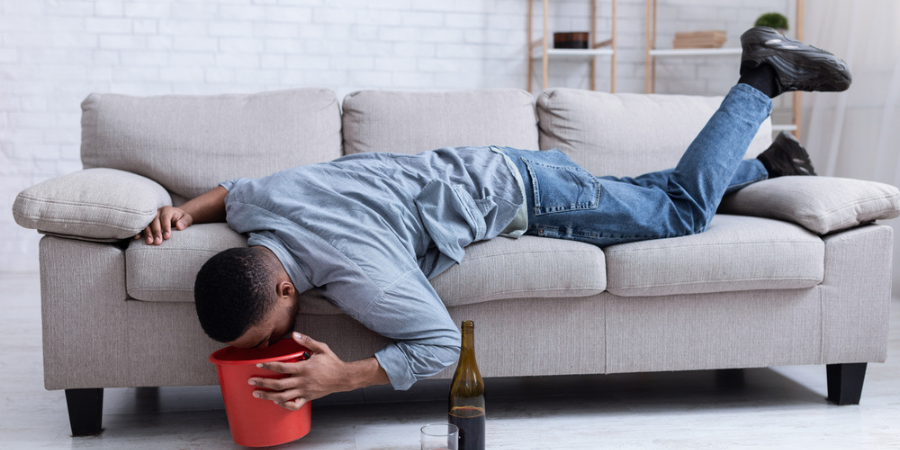
Alcohol poisoning is a very serious and life-threatening condition which occurs when an individual consumes a toxic level of alcohol, leading to a severe dysfunction of the body. Approximately 500 Brits die annually from alcohol poisoning, while 2,200 Americans die each year from it. It is, therefore, important to recognise this issue as a medical emergency. Immediate action is extremely important, as delays can cause irreversible damage or even death.
This article will guide you through identifying the signs of alcohol poisoning, the immediate steps to take, what to avoid, and how to handle such a situation in a foreign country.
The signs of alcohol poisoning
It is extremely important to recognise the signs and symptoms of alcohol poisoning for the simple reason that doing so is the easiest way to prevent severe outcomes. Physical symptoms of alcohol poisoning include:
- Vomiting
- Confusion
- Seizures
- Dangerously slow or irregular breathing
- Skin may appear blue-tinged or pale
- Hypothermia, or an abnormally low body temperature
- Unconsciousness
Behaviourally, people with alcohol poisoning usually act in very erratic ways. They may seem totally unable to stay awake and exhibit a lack of response to stimuli such as loud noises or physical touch. As opposed to someone who is simply drunk, these symptoms indicate an escalation, where the body is completely overwhelmed by the alcohol consumed.
Drunkenness, however, may involve slurred speech, lack of coordination, and drowsiness. Meanwhile, alcohol poisoning can escalate to life-threatening symptoms such as seizures, respiratory failure and unconsciousness. If you are with someone who is exhibiting these behaviours, you must seek medical help immediately.
Immediate actions to take
When dealing with a medical emergency, particularly when that emergency involves someone other than yourself, taking immediate and correct actions can be life-saving. The first step is to call emergency services straight away. This ensures that professional help is on the way as quickly as possible.
While you wait for help to arrive, it is vital that you stay with the person and closely monitor their breathing and their level of consciousness. If the person is not conscious but they’re still breathing, place them in the recovery position–on their side with their head tilted slightly backward. This helps keep the airway clear and reduces the risk of choking on vomit.
It is also extremely important to maintain the person’s body temperature. Cover them with a blanket or coat to prevent hypothermia, especially if they’re in a cold environment, as their ability to regulate body temperature may be impaired.
Make sure you also avoid inducing vomiting, even if they have ingested something harmful. The reason for this is ultimately because forcing them to vomit does more harm than good and could lead to further complications, such as choking or severe damage to the oesophagus. Instead, wait for emergency services to arrive and follow their instructions.
What NOT to do
Here is a list of things a person with alcohol poisoning should avoid doing:
Avoid cold showers or walking them around: These actions can worsen the situation for someone with alcohol poisoning. Cold showers can lead to hypothermia, as alcohol lowers body temperature, and the shock of cold water can cause a person to pass out. Walking them around is also dangerous because alcohol impairs balance and coordination, increasing the risk of falls and injuries.
Do not offer coffee or food: Contrary to popular belief, coffee or food won’t sober someone up. Coffee, a diuretic, can worsen dehydration, while food might increase the risk of choking if the person has impaired gag reflexes. These actions can delay essential medical treatment.
Don’t assume they’ll “sleep it off”: Alcohol poisoning is a life-threatening emergency that won’t resolve on its own. If untreated, it can lead to choking, respiratory failure, or even death. Immediate medical intervention is crucial.
What to do if you are in a foreign country
When travelling to a foreign country, it’s essential to be well-prepared for any situation, especially when it comes to health and safety.
Know local emergency numbers: For example, in the European Union, you would dial 112 for emergencies. It’s crucial to know these numbers before consuming alcohol or engaging in any activities that might increase your risk of needing emergency assistance.
Language barriers: Overcoming language barriers is vital, especially in a medical emergency. Consider using translation apps like Google Translate, learning key medical phrases in the local language, or seeking help from bilingual locals. This preparation can be a lifesaver when quick communication is necessary.
Local laws and medical practices: Familiarise yourself with local laws regarding alcohol consumption, as these can vary widely. Some countries have strict regulations about where and when you can drink, and violating these laws can result in severe penalties. Additionally, medical practices may differ significantly, so understanding the healthcare system in your destination can help you navigate any medical needs more effectively.
Accessing medical care: Before you travel, locate the nearest hospital or clinic and verify that your travel insurance covers emergency medical care abroad. Some countries require upfront payment for treatment, so being financially prepared is essential.
Contacting your embassy: In the event of serious difficulties or inadequate local medical facilities, contacting your embassy can provide critical support. Embassies can assist with finding appropriate care, contacting family members, or even arranging for medical evacuation if necessary.
Being prepared with this knowledge can help ensure your safety and well-being while travelling abroad.
UKAT is available to help treat alcohol addiction in a more long-term way. If you or someone you know is struggling, please reach out today.



